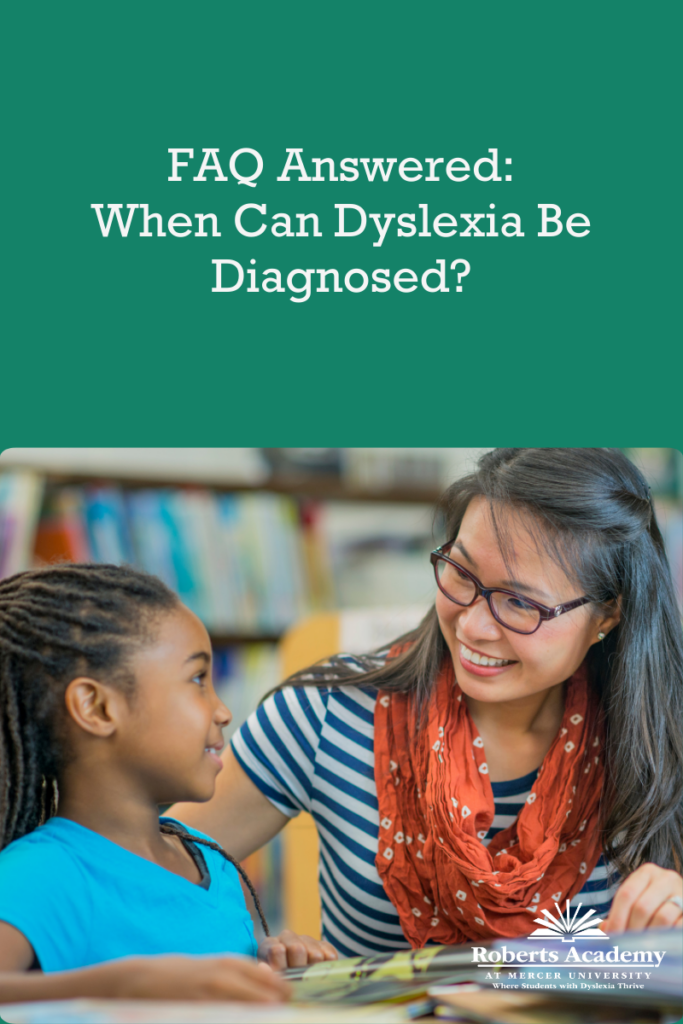“When can dyslexia be diagnosed?” We get this question a lot.
If you suspect your child might have dyslexia, you have a lot of questions, including when and if they can get tested.
While there are several pathways to diagnosis, if your child has dyslexia, the result should always include a remediation plan for your child.
Today, we will guide you through recognizing the signs of dyslexia, the appropriate age for diagnosing dyslexia in children, the steps involved in the diagnostic process, and what to do after a confirmed diagnosis.

If you notice any of these signs or symptoms in your learner (or if their teacher has reported any of these signs), they might have dyslexia:
Most children are diagnosed with dyslexia in elementary school, when reading and writing challenges, as well as a resulting frustration with school, becomes obvious.
Most experts agree that children who are suspected of having dyslexia should be tested and start interventions by 3rd grade.
Early identification and intervention are crucial for reading delays and dyslexia, and students are entitled to a free evaluation provided by their county’s public school system– even if they are not enrolled in a public school.
You can learn more about your special education rights in Georgia here.
In her book, “Overcoming Dyslexia,” Dr. Sally Shaywitz outlines a typical assessment of dyslexia, which often includes:
Evaluations are typically conducted by licensed educational psychologists, but neurologists and other medical professionals can also be qualified to diagnose.
How long does a dyslexia evaluation take? That depends on the assessments given and the age of the student. For younger students, you can expect the evaluation to take between 3-4 hours.
While every clinician has preferences, these assessments are commonly used during an evaluation of dyslexia:
After your child’s evaluation, your clinician will provide you with a detailed report that includes recommendations and next steps.
With this knowledge in mind, you can begin the process of remediation, which can include the development of an IEP (Individualized Education Program) or a 504 Plan.
An Individualized Education Program (IEP) will outline the tailored educational strategy for your student, detailing their current performance levels, objectives, and the educational setting and services they will be provided.
A 504 plan is designed by your child’s school to provide them with the necessary services and assistance to facilitate their learning alongside their peers.
Both 504 plans and IEPs serve as tools to aid students with disabilities in accessing education.
The International Dyslexia Association outlines specific accommodations for students with dyslexia.
At Roberts Academy, we are dedicated to supporting students with dyslexia.
Our multi-sensory curriculum is rooted in the Orton-Gillingham method, a well-established teaching approach backed by decades of research and practice.
We believe it is crucial for students to feel confident to make progress in their learning journey. Therefore, we prioritize creating a positive learning experience that builds self-confidence and motivation.
Our instruction begins with fundamental concepts, such as word and language structure, and gradually incorporates reading, spelling, and writing skills. We maintain open communication with students to ensure they understand each step and feel empowered by their progress.
The Orton-Gillingham method is tailored to individual student needs, employing various learning techniques to foster success.
By providing personalized, structured, and supportive instruction, we aim to help each of our students reach their full potential in literacy and beyond.
Roberts Academy is the only school in Georgia outside of Metro Atlanta specifically designed for students with dyslexia.
Roberts is an independent, transitional school. Its aim is to equip students with the foundational skills they will need to succeed in a traditional school setting.
When remediated, these students will return to their age-appropriate grade at a school chosen by their parents.
The Academy is scheduled to open this August. For more information and to learn about the application process, visit us at robertsacademy.org.
Discover Roberts Academy at Mercer University in Macon, Georgia!